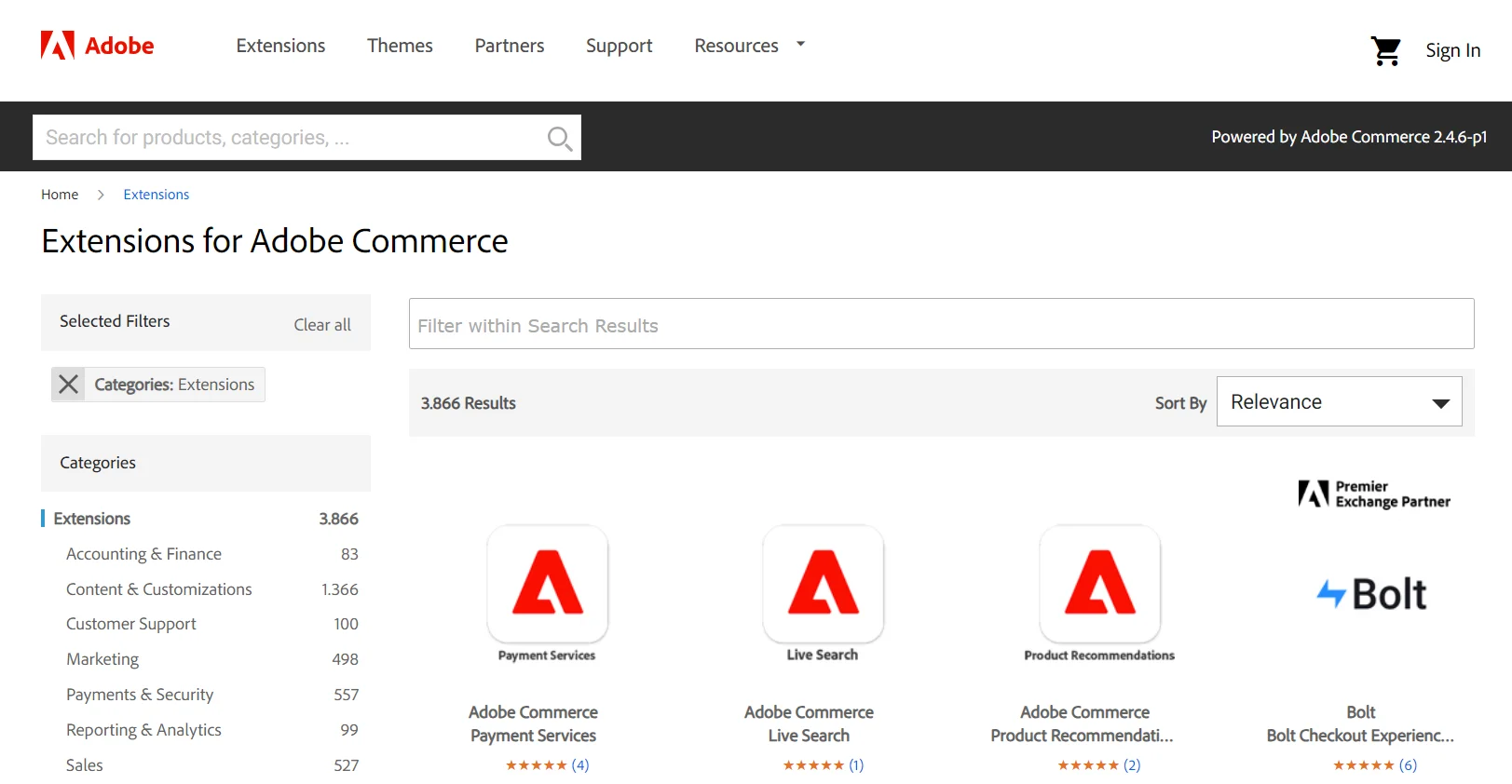When choosing the perfect platform that comes with extensive customizability for online businesses, merchants might stuck between Shopware vs Magento. While Shopware boasts an intuitive interface and robust features, perfect for scalable ventures, Magento offers unmatched flexibility and a vast third-party ecosystem, ideal for those seeking complete control.
If you are not sure which platform to go for, you've reached the right resources! In this article, LitExtension – #1 eCommerce Migration Service will help you pick out the most suitable option by going through the following key points:
- Pricing
- Hosting requirements
- Ease of use
- Customizability
- SEO & marketing
- eCommerce features
- Extensions & integrations
- Community & support
- Security
Without further ado, let’s dive right in!
Shopware vs Magento: Key Takeaways
- The two platforms are both leading eCommerce platforms that many businesses trust for their online stores. Each has its own set of standout qualities.
- Shopware shines with its focus on marketing, a friendly interface that’s easy to use, and customization that doesn’t require much technical know-how. It’s a favorite in German-speaking areas and fits perfectly with business-to-customer (B2C) sales models.
- Magento sets the bar high with powerful tools, the ability to grow with your business, and deep customization options. It’s particularly strong in search engine optimization (SEO) and marketing, making it the go-to for bigger companies.
- When it comes to cost, Shopware and Magento offer different starting points. The best choice for you will hinge on how much you’re willing to spend and the features you need for your business.
Magento 2 vs Shopware: At A Glance
Shopware overview
Shopware, a prominent player in the eCommerce platform landscape, has a 19-year history in the market. As an open-source solution, it provides flexibility and easy customization for online stores.

What sets Shopware apart is its marketing-oriented approach. It is designed to support businesses aiming to enhance their brand awareness through storytelling and the creation of unique shopping experiences. Particularly well-suited for B2C models, Shopware has become a preferred choice for fashion, art, and lifestyle industries seeking an ideal online presence.
Magento overview
Despite being around since 2007, Magento (Adobe Commerce) continues to maintain its global influence. This top open-source e-commerce platform stands out for its strong capabilities and adaptability. Supported by a global network of 150,000 developers and over 300 highly-trained solution partners, Magento primarily serves large businesses with significant online sales.

This platform covers all aspects of business operations, including inventory management, marketing tools, and report analysis. To enhance customer satisfaction during the shopping experience, Magento offers options for custom products and rule-based merchandising.
The strength of Magento lies in its scalability and customization capabilities. Yet, these benefits are accompanied by a challenging learning process, particularly for those without technical expertise, owing to the significant coding involved.
Magento is available in 2 distinct editions:
- Magento Open Source (previously known as Community Edition): Designed for small to medium-sized businesses.
- Adobe Commerce Cloud Edition: Tailored for larger enterprises.
Shopware vs Magento – Which platform is better for your business?
If you’re someone who grasps concepts quickly, have a glance at the following comparison table to understand the competition between Magento vs Shopware.
Feature | Magento | Shopware | Winner |
Hosting Requirements |
|
| Shopware |
Ease of Use |
|
| Shopware |
Customization |
|
| Magento |
SEO & Marketing |
|
| Magento |
eCommerce Features | Advanced SEO, diverse payment integrations, bespoke shopping journeys. | Built-in marketing, intelligent product clusters, mobile-friendly. | Magento |
Extensions & Integration | Over 3,400 extensions, suitable for large-scale eCommerce. | Over 3,500 modules, mostly in German, reflecting a European focus. | Magento |
Community & Support | Vast network of developers, partners, and forums. | Customer support at a monthly fee, technical account manager, academy. | Magento |
Performance & Security | Handles high volumes of traffic and sales, robust security measures. | Fresh design, uses Elasticsearch for quick product search. | It’s a draw! |
Pricing Plans
Shopware and Magento both have varied pricing options tailored to the features they offer. Here’s an essential comparison to guide your decision:
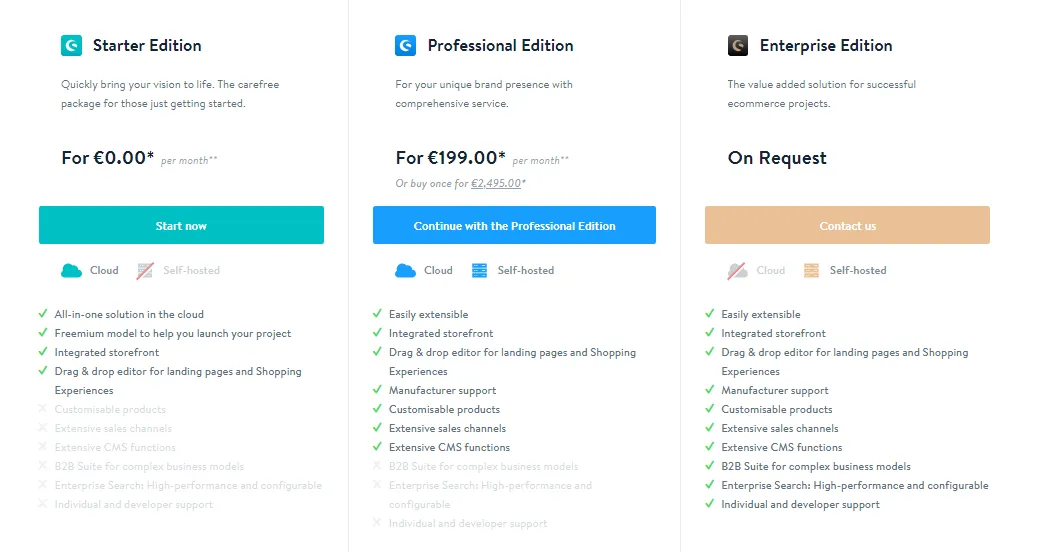
Starter/Budget: Shopware provides a free Starter Edition for newcomers to get acquainted with the platform. On the other hand, Magento also comes with an open-source version (Magento Community Edition – Magento CE) that is completely free to install. However, you still need to pay for hosting, domains, SSL, development, themes, and add-ons.
- Web hosting ($9.95 – $29.95/month);
- Domain Cost ($10 – $20/year);
- SSL Certificate Cost ($0 – $600/year);
- Magento Developer Cost ($65 – $150/hour);
- Themes ($17 – $5,000+);
- Extensions and Add-ons ($0 – $2,000+).
Mid-Range: Shopware’s Professional Edition (€199 per month or approximately $213.43 per month) is designed for growing businesses, offering more advanced features. On the other hand, Magento’s pricing in this range can differ widely. Depending on the business’s size and needs, Magento Commerce’s pricing starts at $1,999 per month.
Enterprise: Shopware offers an Enterprise Edition option for large businesses with intricate requirements. It includes all the advanced features of the Professional package, plus 24/7 customer support, a dedicated account manager, and a B2B suite. The one-time fee is €39,995 ($42,730), or €2,495 ($2,666) per month.
Meanwhile, Magento’s enterprise solution, Magento Commerce Cloud, costs between $40,000 and $190,000 a year, depending on the specific tier and features selected. Of course, it is packed with extensive features for large-scale operations.
Average Gross Sales Revenue | Magento Commerce Cost |
< $1,000,000 | $40,000/year |
$1,000,000 - $5,000,000 | $55,000/year |
$5,000,000 - $10,000,000 | $80,000/year |
$10,000,000 - $25,000,000 | $120,000/year |
$25,000,000+ | $190,000/year |
⮞ Quick verdict
Shopware pricing is more accessible for startups and small businesses with its free Starter Edition. Meanwhile, Magento caters to mid-range and enterprise-level businesses with its Commerce and Cloud editions, offering extensive features at a higher cost.
Hosting Requirements
Hosting requirements directly impact your website’s performance and scalability. Let’s compare the hosting specifications for both platforms:
Shopware | Magento | |
Operating system | Unix-based | Linux x86-64 |
PHP | 8.2 and 8.3 | 7.4 or higher |
Database | - MySQL 8.0 or higher - MariaDB 10.11 or higher | MariaDB 10.4 or higher |
Web server | - Apache 2.4 or higher - NGINX is also supported | - Apache 2.4 or higher - NGINX is also supported |
When it comes to hosting requirements, Shopware may have an edge for businesses looking for a platform with a more modern stack and higher base memory requirement. This could imply better performance and scalability out-of-the-box. On the other hand, as one of Shopware competitors, Magento offers flexibility with a lower memory requirement for development, making it accessible for a wider range of hosting environments.
⮞ Quick verdict
When it comes to Shopware vs Magento in terms of hosting, it’s clear that Shopware does not require high-performing devices like Magento. This makes it an easier-to-install option for general users comparing to its counterpart.
Ease Of Use
Shopware is widely recognized for its user-friendly design, prioritizing ease of use to accommodate users with various technical skill levels. With a clean, intuitive interface and drag-and-drop capabilities, Shopware simplifies the process of adding and organizing products, managing orders, and adjusting store settings. The dashboard is well-structured, giving users a clear view of essential data and tasks, which makes daily operations smoother.
On the other hand, Magento is known for its power and flexibility, though these attributes come with a steeper learning curve. Designed primarily for businesses with complex needs, Magento provides an extensive suite of customization options in its backend, which can feel overwhelming to new users. The platform’s setup and management often require technical expertise, making Magento an ideal choice for businesses that have access to IT support or dedicated developers.
Magento’s interface offers depth, but the intricate configuration options and features mean it takes time to master. However, recent updates to Adobe Commerce have added a drag-and-drop page builder and layout customization tools that make creating web pages and designing layouts more accessible for non-technical users. Still, due to the complexity of Magento’s features, businesses often rely on technical assistance during setup and ongoing management.
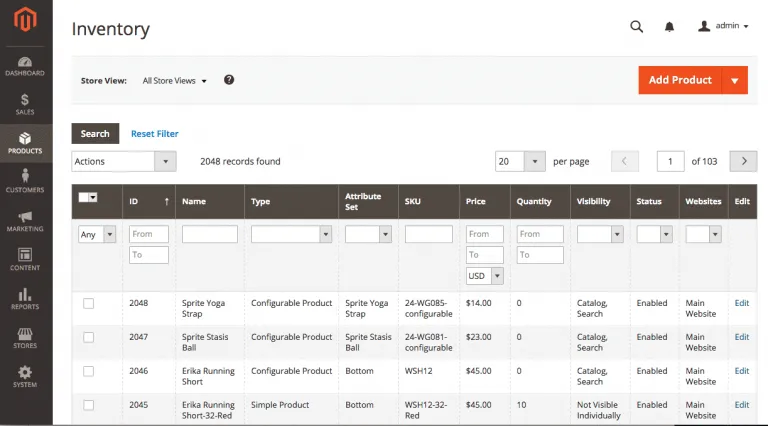
⮞ Quick verdict
For businesses prioritizing a simple, accessible experience, Shopware is often the better choice when comparing Shopware vs Magento. Its intuitive interface and modular approach allow non-technical users to manage the platform effectively and scale up as needed.
Customizability
Indeed, Shopware and Magento are adaptable platforms that offer a wide range of personalization features to cater to the distinct requirements of digital shops.
In contrast, Shopware focuses on ease of use while still providing plenty of customization choices. Its user-friendly backend interface lets even those with minimal technical skills make adjustments without needing to code.
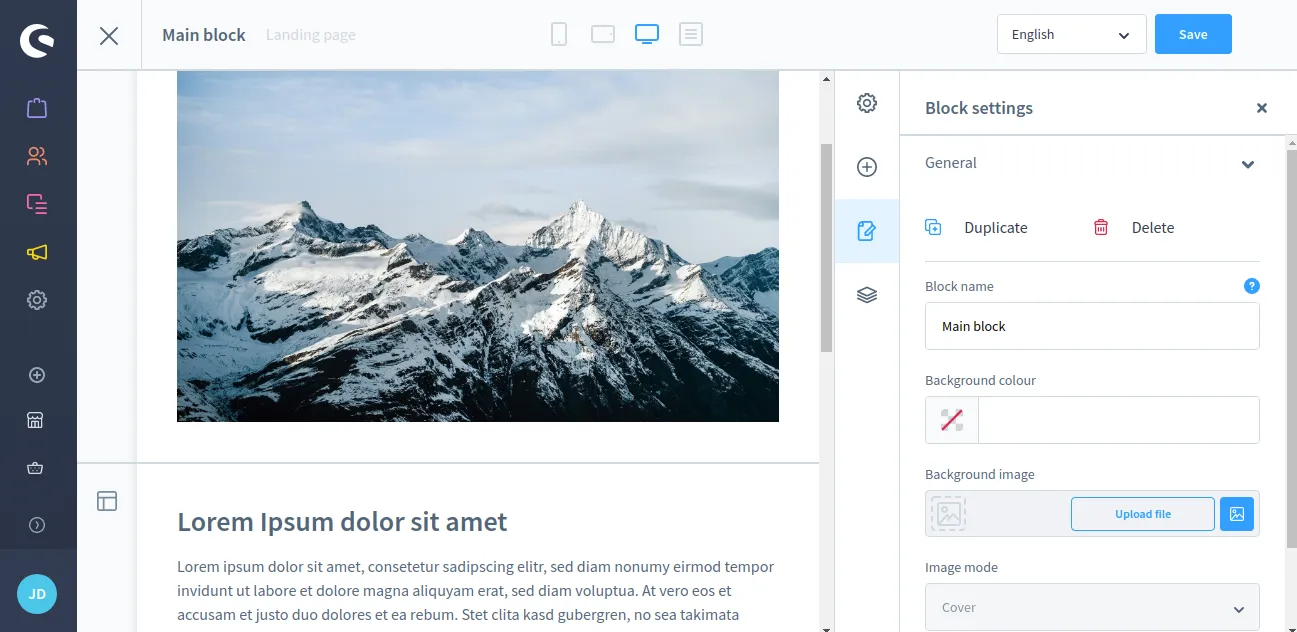
Shopware’s “Shopping Worlds” feature includes a drag-and-drop tool that makes it simple to design landing pages with customizable components such as image sliders, banners, and product showcases.
So what about Magento? Magento is highly customizable and offers advanced control over store design and functionality thanks to its open-source framework that gives users complete access to the underlying code. This feature allows developers to build unique layouts, add new features, and create custom workflows. However, businesses may need technical expertise or developer support to make the most of Magento’s options.
⮞ Quick verdict
When it comes to Shopware vs Magento in terms of customizability, Magento offers more freedom than Shopware, making it an attractive Shopware alternative for tech-savvy retailers.
SEO & Marketing
Shopware’s SEO setup lays a strong foundation for good Google rankings and includes robust tools for boosting sales. The platform is pre-configured for SEO but allows custom adjustments. Its “Storytelling” feature creates a unique, genuine feel, enhancing the shopping journey by revealing more product details through interactive images, leading to a pleasant user experience and improved site usability.
On top of that, Shopware also offers SEO plugins like the SEO Professional plugin (€249 or approximately $267.13) for traffic and conversion enhancement, combining numerous SEO features.
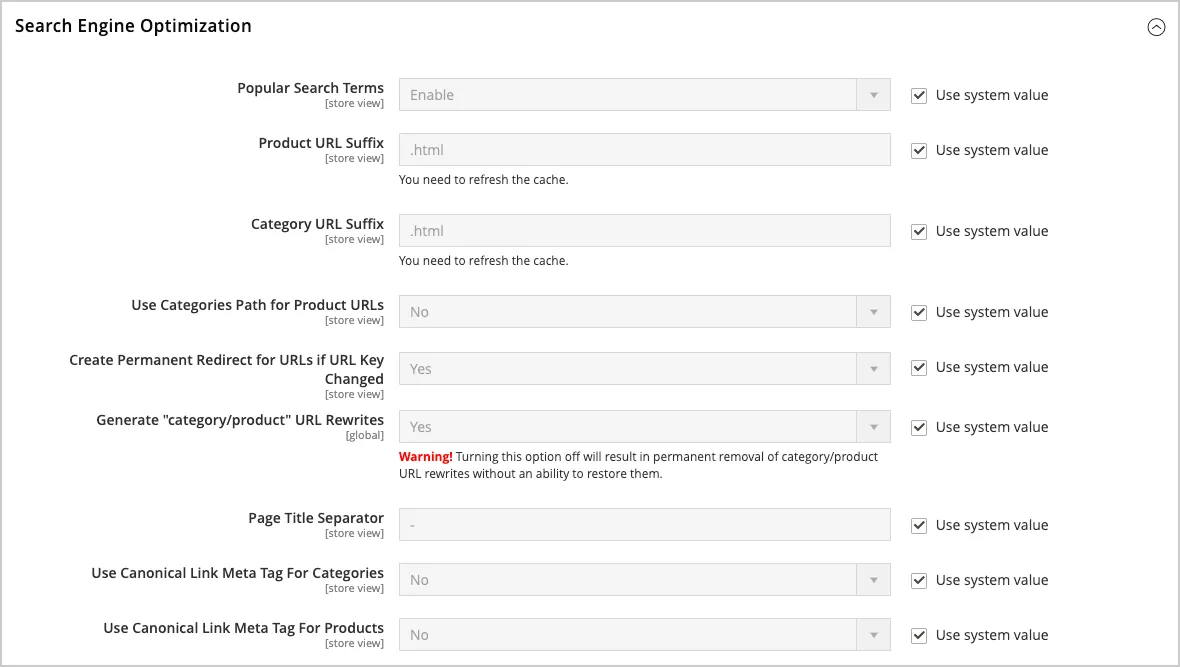
In comparison, Magento provides a comprehensive suite of features to foster customer relationships and increase traffic, including customizable coupons and reward points to incentivize repeat purchases. Magento’s marketing capabilities vary with the chosen plan, but even Magento Open Source users can find SEO & Marketing plugins in the Magento Marketplace, with 469 options ranging from free to $999.
The SEO Suite Ultimate ($299) is notable for its extensive on-page SEO tools, tackling duplicate content, site indexation, URL optimization, and metadata, along with advanced sitemaps, cross-linking, SEO redirects, and rich snippet options.
⮞ Quick verdict
When it comes to SEO & marketing features between Shopware vs Magento, Magento tends to offer more control over SEO elements and a wider array of marketing tools.
eCommerce features
To help you better compare Shopware vs Adobe Commerce, we’ve organized the key aspects of their eCommerce features in the table below.
Aspect | Shopware | Magento |
Product Management | Streamline with group edits, tailored sorting, and intelligent product clusters. | Provide comprehensive management with various product types, filtering systems, and individualized product features. |
Checkout Experience | Swift and straightforward, offering guest purchasing and a range of payment gateways. | Seamless single-page checkout and a customizable journey with diverse payment integrations. |
Marketing Capabilities | Come with built-in marketing functionalities such as email outreach, segmenting customers, and variable pricing strategies. | Stand out with advanced SEO features, email outreach, customer segmentation, and bespoke shopping journeys. |
Customization Potential | Offer broad customization through a user-friendly platform. | Deliver wide-ranging customization capabilities, though technical knowledge may be needed. |
Multi-Store Support | Facilitate Shopware multichannel management under one administrative interface. | Enable operation of various storefronts, ideal for international scaling with different languages and monetary units. |
Mobile-Friendly Solutions | Ensure an adaptable design for mobile devices. | Provide a mobile-adapted shopping cart and the option to develop proprietary mobile applications. |
⮞ Quick verdict
Magento stands out regarding eCommerce features in the battle of Shopware vs Magento. It offers advanced SEO features, email outreach, customer segmentation, and bespoke shopping journeys, making it a robust choice for online businesses.
Extensions & Integrations
Shopware, popular in German-speaking regions, has over 3,500 modules with prices ranging from €0 to €7,990. These add-ons cover a wide range of features, including marketing, SEO, payment gateways, and shipping options. Shopware’s modular design allows businesses to add these features as needed, which is beneficial for growing stores that want to avoid unnecessary costs.
For more complex integrations, you can utilize the Shopware API. This API allows developers to connect Shopware with third-party systems, such as CRM or ERP platforms, for seamless data flow across business operations.
Please note that these integrations are mostly in German, reflecting its European focus. This could limit options for specific needs outside this region.
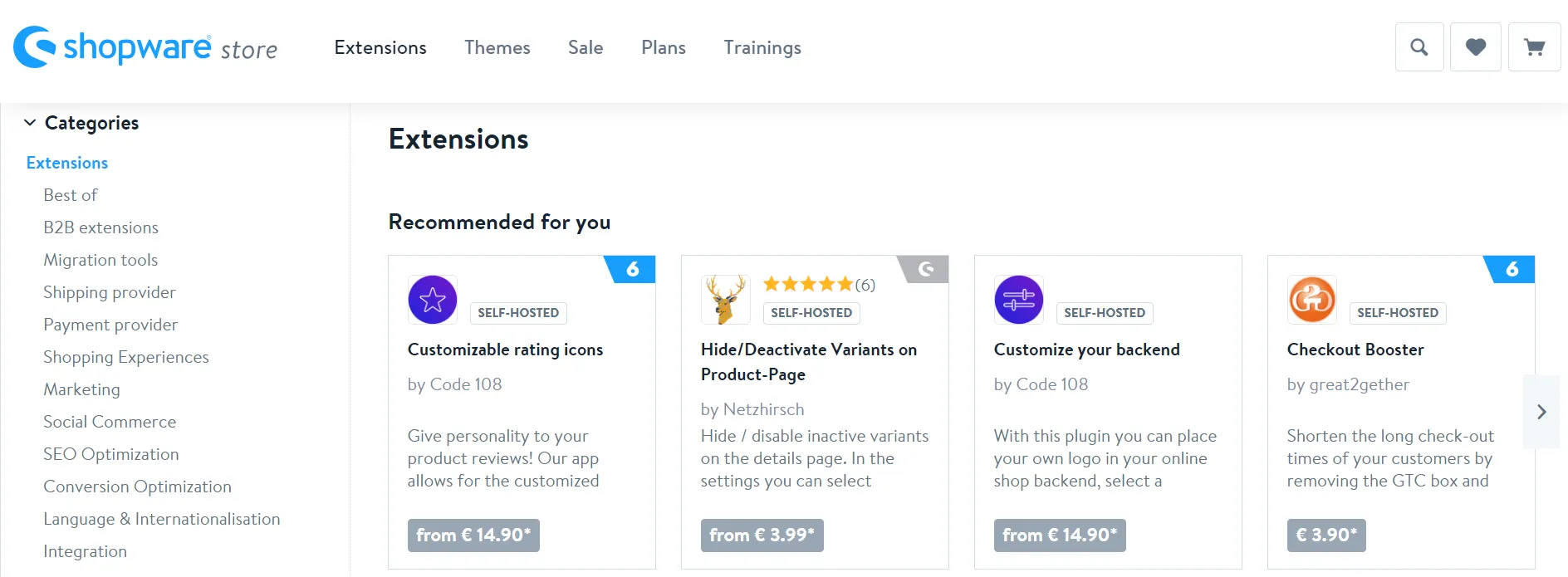
On the other hand, Magento 2 is expanding with over 3,400 extensions across various categories. It has improved module compatibility, reducing conflicts seen in Magento 1. Like Shopware, Magento offers both free and priced extensions. Prices for the latter range from $40 to $10,000 or even higher, depending on the desired features.
Magento’s robust API also allows developers to create custom connections with CRM, ERP, and other enterprise systems, making it highly adaptable for businesses with unique requirements.
⮞ Quick verdict
Magento generally takes the lead in the competition between Shopware vs Magento. It is known for its robust features and flexibility, making it suitable for large-scale eCommerce businesses that require extensive customization and integration capabilities.
Community & Support
Shopware has a dedicated and growing community, particularly strong in Europe. The Shopware Community Forum allows users to share knowledge, discuss features, and troubleshoot common issues. This forum is valuable for beginners and advanced users alike, as it provides a space for exchanging ideas and solutions. Additionally, Shopware hosts events, webinars, and training programs to help users improve their skills and stay updated on platform features.
How about its support? Shopware’s support options vary by edition. The Community Edition relies primarily on community support, with limited direct assistance. However, users who opt for the Professional or Enterprise editions gain access to official support channels. These channels provide more direct help, including priority support for Enterprise customers. Shopware also offers extensive documentation, covering everything from setup to advanced customization, making it easier for users to find answers independently.
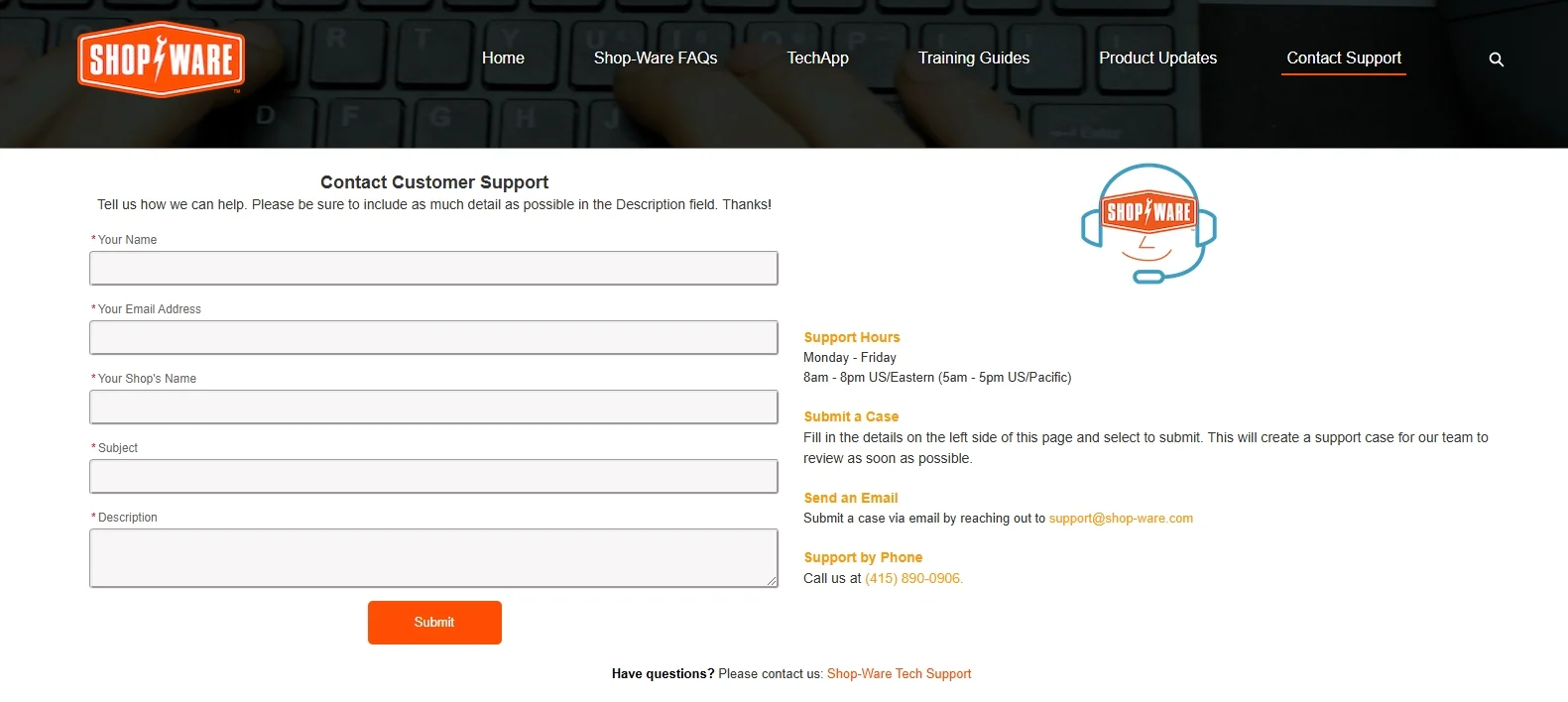
For Magento, this platform comes with one of the most extensive eCommerce communities globally, including a wide range of developers, agencies, and merchants, all contributing to forums, meetups, and events. The Magento Forums are a popular resource, offering advice and solutions from experienced users and Magento staff. Magento also has an active developer community that shares insights, best practices, and even custom code snippets.
On the other hand, support options also vary between Magento’s versions. The Open Source version primarily relies on community and forum-based support, making it a more independent learning path. However, Adobe Commerce users gain access to official support from Adobe, which includes priority support and personalized assistance. Adobe Commerce support also offers security updates, troubleshooting, and proactive monitoring, which makes it ideal for larger businesses needing consistent technical help.
Furthermore, Magento’s documentation and knowledge base are comprehensive, with detailed guides covering nearly every feature and function.
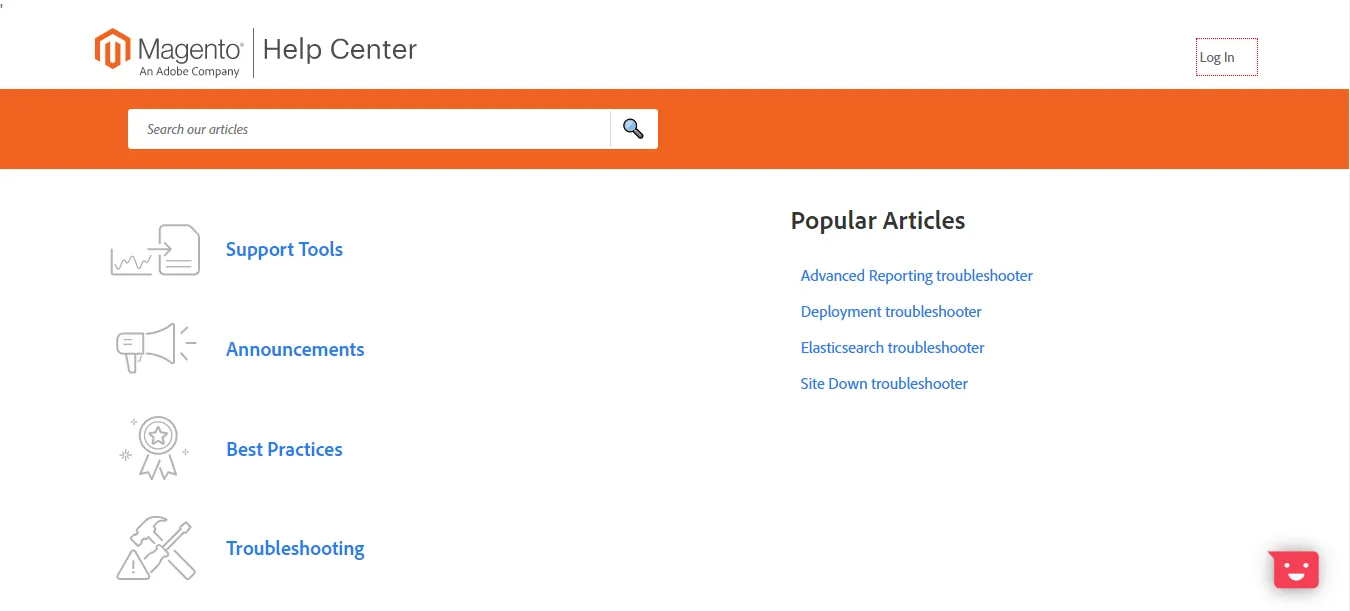
⮞ Quick verdict
In terms of community & support between Shopware vs Magento, Magento takes the lead with its vast network of developers, partners, and support forums.
Security
Shopware includes several built-in security features to protect both store data and customer information. For instance, Shopware complies with GDPR (General Data Protection Regulation), which is especially important for businesses operating in Europe. By adhering to these standards, Shopware helps businesses manage and protect customer data more effectively.
In addition to GDPR compliance, Shopware provides SSL (Secure Sockets Layer) encryption to ensure that data transferred between the server and users is secure. This encryption is critical for preventing data breaches during transactions. Shopware also offers two-factor authentication for account security, which reduces the risk of unauthorized access. For added flexibility, Shopware allows users to enhance security further by integrating additional security plugins, providing more options for businesses with specific security requirements.
Now, let's talk about Magento. This platform is known for its extensive security features, making it a solid choice for businesses with complex security needs. Like Shopware, Magento provides SSL encryption for secure data transmission and two-factor authentication for account protection. However, Magento’s security measures go a step further with PCI DSS (Payment Card Industry Data Security Standard) compliance, which is particularly beneficial for stores handling large volumes of credit card transactions. This compliance ensures that Magento meets industry standards for the safe handling of payment information.
⮞ Quick verdict
It's a tie between Shopware vs Magento in terms of security since both platforms offer users a robust set of features to protect their stores.
Our Methodology to Test Shopware vs Magento
In our effort to offer a clear and honest comparison of Shopware vs Magento, we follow a detailed approach that reflects our 10-year experience helping thousands of merchants migrate between different eCommerce platforms.
Our approach focuses on key criteria such as ease of use, value for money, scalability, built-in features, extensions, security, and support. This holistic evaluation ensures that we offer insights that are not only informative but also actionable. As a result, we aim to help you make the best decision for your unique business needs.
Additionally, our comparative analysis begins with an in-depth market research phase, where we immerse ourselves in the latest eCommerce trends and technologies. We then create demo stores on both Shopware and Magento, allowing us to experience firsthand the user interface, performance, and overall merchant and customer journey. This practical assessment is key to grasping the subtle differences between each platform and determining how they can meet the needs of businesses of various sizes and types.
Finally, we compare Shopware vs Magento side by side, looking at each one’s unique community, the variety and excellence of their add-ons, and the customer support they offer. We shape our content to simplify complex parts into stories that are easy to understand and interesting, making sure you stay informed with up-to-date and applicable knowledge in the fast-changing world of online business.
Shopware vs Magento – FAQ
What is the difference between Magento and Shopware?
Magento (Adobe Commerce) is highly customizable and ideal for large businesses with complex needs, offering full control and advanced customization. It requires technical resources due to its complexity. Shopware, however, focuses on ease of use, making it more accessible for mid-sized businesses. Its modular structure allows businesses to start small and expand as needed.
What does Shopware do?
Shopware is an eCommerce platform that helps businesses build and manage online stores with essential features for product management, order processing, and marketing. It’s known for its modular, scalable design, allowing businesses to start with basic tools and add more as they grow. Furthermore, Shopware integrates with popular third-party tools for seamless management. Its user-friendly structure and GDPR compliance make it popular in Europe, supporting businesses seeking flexibility and simple customization.
Why choose Shopware?
Shopware is ideal for businesses wanting flexibility and ease of use. Its modular setup allows companies to add features as they grow, avoiding upfront costs for unneeded tools. With many plugins and integration options, Shopware is suited for businesses seeking a user-friendly platform that scales easily, making it an attractive choice for growth-oriented companies without extensive technical resources.
What is the disadvantage of Magento?
Magento’s complexity is a disadvantage, as it often requires technical support or developers for setup and maintenance. This can raise costs, making Magento less suitable for smaller businesses or those without an IT team. Therefore, Magento is best for larger businesses with the resources for ongoing technical management and custom development.
Conclusion
Choosing the right platform is crucial for managing your business with efficiency and agility. Shopware vs Magento stand out, each with its set of unique features tailored to different business needs.
Shopware shines as the go-to platform for small to medium-sized businesses, offering ease of use and affordability without compromising on functionality. On the flip side, Magento caters to those looking to scale up their operations. It’s an ideal match for businesses ready to invest in a platform rich in eCommerce features, supporting extensive growth and expansion.
If you’re contemplating a transition between these platforms, whether it’s Shopware Magento migration or Magento Shopware migration, LitExtension is your right partner. Our migration service guarantees a swift, secure, and precise transfer of your valuable data. For further details, feel free to contact us!
